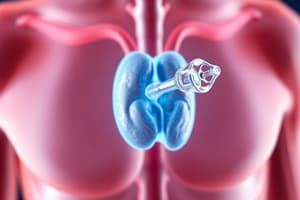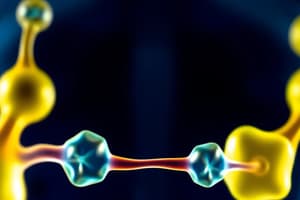Podcast
Questions and Answers
What type of diabetes is characterized by the absence of insulin?
What type of diabetes is characterized by the absence of insulin?
- Type 1 (correct)
- Gestational diabetes
- Type 2
- Latent autoimmune diabetes in adults (LADA)
Which of the following is a symptom of Diabetes Mellitus due to high blood glucose levels?
Which of the following is a symptom of Diabetes Mellitus due to high blood glucose levels?
- Fatigue
- Increased appetite
- Decreased urine output
- Dehydration (correct)
What is the primary consequence of untreated ketoacidosis?
What is the primary consequence of untreated ketoacidosis?
- Coma and death (correct)
- Hypertension
- Chronic fatigue syndrome
- Hypoglycemia
What happens to the body's use of fats in diabetes due to ineffective insulin?
What happens to the body's use of fats in diabetes due to ineffective insulin?
Which of the following describes the effect of high blood glucose on cellular activity?
Which of the following describes the effect of high blood glucose on cellular activity?
What primarily triggers the release of growth hormone from the anterior pituitary?
What primarily triggers the release of growth hormone from the anterior pituitary?
Which hormone is directly produced by the parafollicular cells of the thyroid gland?
Which hormone is directly produced by the parafollicular cells of the thyroid gland?
What condition is a result of hypersecretion of growth hormone in children?
What condition is a result of hypersecretion of growth hormone in children?
What is the major function of thyroid hormones in the body?
What is the major function of thyroid hormones in the body?
In adults, hypothyroidism can lead to which of the following conditions?
In adults, hypothyroidism can lead to which of the following conditions?
What hormone does the pancreas secrete to lower blood glucose levels?
What hormone does the pancreas secrete to lower blood glucose levels?
When is growth hormone primarily at its highest levels?
When is growth hormone primarily at its highest levels?
Which gland is primarily responsible for synthesizing thyroid hormones?
Which gland is primarily responsible for synthesizing thyroid hormones?
Which of the following can cause goiter development in adults?
Which of the following can cause goiter development in adults?
What is the primary effect of insulin after glucose enters a target cell?
What is the primary effect of insulin after glucose enters a target cell?
What physiological effect does growth hormone have on fatty acids?
What physiological effect does growth hormone have on fatty acids?
What is the effect of rising blood levels of amino acids on insulin secretion?
What is the effect of rising blood levels of amino acids on insulin secretion?
What type of tissue is the anterior pituitary primarily composed of?
What type of tissue is the anterior pituitary primarily composed of?
What condition is caused by the hypersecretion of thyroid hormones?
What condition is caused by the hypersecretion of thyroid hormones?
Flashcards
Type 1 Diabetes
Type 1 Diabetes
A state of low insulin levels, leading to high blood sugar. It is characterized by the absence of insulin, often due to an autoimmune attack on the pancreas.
Type 2 Diabetes
Type 2 Diabetes
A state of insulin resistance, where the body produces insulin but cells do not respond to it properly, resulting in high blood sugar. It is often associated with lifestyle factors like obesity and inactivity.
Ketogenesis
Ketogenesis
The breakdown of fat for energy due to insufficient glucose availability in cells. This process results in the production of ketones, which are acidic.
Ketoacidosis
Ketoacidosis
Signup and view all the flashcards
Insulin
Insulin
Signup and view all the flashcards
What is the Anterior Pituitary?
What is the Anterior Pituitary?
Signup and view all the flashcards
What is Growth Hormone (GH)?
What is Growth Hormone (GH)?
Signup and view all the flashcards
What are the Direct Actions of Growth Hormone on Metabolism?
What are the Direct Actions of Growth Hormone on Metabolism?
Signup and view all the flashcards
What are the Indirect Actions of Growth Hormone for Growth?
What are the Indirect Actions of Growth Hormone for Growth?
Signup and view all the flashcards
How do Growth Hormone Levels Change?
How do Growth Hormone Levels Change?
Signup and view all the flashcards
What happens when there's too much Growth Hormone?
What happens when there's too much Growth Hormone?
Signup and view all the flashcards
What happens when there's not enough Growth Hormone?
What happens when there's not enough Growth Hormone?
Signup and view all the flashcards
What is the Thyroid Gland?
What is the Thyroid Gland?
Signup and view all the flashcards
What are the Forms of Thyroid Hormone?
What are the Forms of Thyroid Hormone?
Signup and view all the flashcards
How is Thyroid Hormone Synthesized?
How is Thyroid Hormone Synthesized?
Signup and view all the flashcards
What are the Major Effects of Thyroid Hormone?
What are the Major Effects of Thyroid Hormone?
Signup and view all the flashcards
How is Thyroid Hormone Release Regulated?
How is Thyroid Hormone Release Regulated?
Signup and view all the flashcards
What happens when there's not enough Thyroid Hormone?
What happens when there's not enough Thyroid Hormone?
Signup and view all the flashcards
What happens when there's too much Thyroid Hormone?
What happens when there's too much Thyroid Hormone?
Signup and view all the flashcards
What is the Pancreas and what does it produce?
What is the Pancreas and what does it produce?
Signup and view all the flashcards
Study Notes
Endocrine System Overview
- The endocrine system is a network of glands that secrete hormones into the bloodstream.
- Hormones regulate various bodily functions, such as metabolism, growth, and reproduction.
Important Topics and Pages
- Growth Hormone (GH): Understand the mechanisms, effects, and glands that produce GH. Learn about disorders caused by homeostatic imbalance (pages 615-616).
- Thyroid Hormone (TH): Understand the mechanisms, effects, and glands that produce TH. Study disorders that result from homeostatic imbalance (pages 617-620).
- Insulin: Understand the mechanisms, effects, and glands that produce insulin. Study diabetes mellitus (pages 630-632).
- Student Research Presentations: Understand the pathophysiology of endocrine disorders covered.
Endocrine Glands and Specific Hormone Functions
- Specific examples of hormone pathways will be covered including:
- Growth hormone
- Thyroid hormone
- Insulin
Hypothalamus and Pituitary Gland
- The hypothalamus is connected to the pituitary gland via the infundibulum.
- The pituitary gland secretes at least eight major hormones.
- It has two lobes:
- Posterior pituitary: Composed of neural tissue; secretes neurohormones. Not technically an endocrine gland.
- Anterior pituitary (adenohypophysis): Composed of glandular tissue.
Anterior Pituitary Hormones
- The anterior pituitary secretes 6 peptide hormones.
- Growth hormone (GH), also called somatotropin.
- Produced by somatotropic cells.
- Directly affects metabolism and indirectly promotes growth.
- Anterior pituitary is stimulated to release GH when the hypothalamus secretes Growth Hormone Releasing Hormone (GHRH).
Growth Hormone (GH): Direct Actions on Metabolism
- Glucose-sparing actions decrease the rate of cellular glucose uptake and metabolism.
- Triggers the liver to break down glycogen to glucose.
- Increases blood levels of fatty acids.
- Encourages cellular protein synthesis via amino acid uptake.
Growth Hormone (GH): Indirect Actions on Growth
- GH triggers liver, skeletal muscle, and bone to produce insulin-like growth factors (IGFs).
- IGFs stimulate:
- Uptake of nutrients for DNA and protein synthesis for cell division.
- Formation of collagen and bone matrix deposition.
- Growth and division of most cells, primarily bones and skeletal muscle.
Growth Hormone (GH): Daily Cycles and Imbalances
- GH levels cycle daily, highest during sleep.
- Levels are highest during adolescence, decreasing in adulthood.
- Important in metabolic regulation throughout life.
- Hypersecretion of GH in children causes gigantism, in adults acromegaly.
- Hyposecretion in children causes pituitary dwarfism.
Thyroid Gland
- Butterfly-shaped in the anterior neck.
- On the trachea, just inferior to the larynx.
- Consists of:
- Lateral lobes (one on each side).
- Isthmus (connecting the lobes).
- Follicles with colloid (thyroglobulin plus iodine; precursor to thyroid hormone).
- Parafollicular cells producing calcitonin.
Thyroid Hormone (TH): Structure
- Two forms:
- T₄ (thyroxine): primary form secreted by thyroid follicles; two tyrosine molecules with four bound iodine atoms.
- T₃ (triiodothyronine): has two tyrosines with three bound iodine atoms; more active form.
- Both are iodine-containing amine hormones, affecting virtually every cell.
Thyroid Hormone (TH): Synthesis
- Follicular cells synthesize thyroglobulin, bind it with iodine in the colloid.
- Tyrosines are linked to form T₃ and T₄, which are cleaved and released into blood, bound to transporter proteins.
Thyroid Hormone (TH): Effects
- Increases basal metabolic rate and heat production.
- Regulates tissue growth and development, particularly for skeletal and nervous systems, and reproductive capabilities.
- Maintains blood pressure and increases adrenergic receptors in blood vessels.
Thyroid Hormone (TH): Regulation
- Hypothalamus releases Thyrotropin Releasing Hormone (TRH).
- TRH stimulates TSH release from the anterior pituitary.
- TSH stimulates thyroid hormone release.
- Negative feedback loop: Thyroid hormones inhibit TRH and TSH release.
Thyroid Hormone (TH): Homeostatic Imbalances
- Hyposecretion (hypothyroidism): Myxedema (mucous swelling) in adults with symptoms like low metabolic rate, thick/dry skin, puffy eyes, feeling chilled, constipation, edema, mental sluggishness, lethargic feeling. Iodine deficiency can cause goiter.
- Hypersecretion (hyperthyroidism): Most commonly in Graves' disease, an autoimmune disease. Symptoms include high metabolic rate, sweating, rapid/irregular heartbeat, nervousness, weight loss and exophthalmos (eyes protrude).
Pancreas
- Triangular gland located behind the stomach.
- Has exocrine and endocrine cells.
- Acinar cells: produce digestive enzymes rich juice.
- Pancreatic islets (islets of Langerhans): Contain endocrine cells:
- Alpha (α) cells produce glucagon (hyperglycemic hormone).
- Beta (β) cells produce insulin (hypoglycemic hormone).
Insulin
- Secreted when blood glucose levels increase, lowering blood glucose.
- Synthesized as proinsulin, then modified.
- Binds to tyrosine kinase receptors on cell surfaces.
- Lowering blood glucose levels in three ways:
- Enhances glucose transport into fat and muscle cells.
- Inhibits glycogen breakdown to glucose.
- Inhibits amino acid or fat conversion to glucose.
- Insults catalyzes glucose oxidation for ATP production, polymerizes glucose to glycogen, and converts glucose to fat (particularly in adipose tissue).
Factors Influencing Insulin Release
- Elevated blood glucose levels, a primary stimulus.
- Rising amino acid and fatty acid blood levels.
- Release of acetylcholine by parasympathetic nerve fibers.
- Hormones: glucagon, epinephrine, growth hormone, thyroxine, glucocorticoids.
- Somatostatin and sympathetic nervous system inhibit insulin release.
Insulin and Blood Sugar Homeostasis
- Insulin helps maintain blood sugar homeostasis along with glucagon.
- High blood glucose levels stimulate insulin release; cells take up glucose, glycogen formation in the liver, and glucose conversion to fat.
- Low blood glucose stimulates glucagon release; liver breaks down glycogen to glucose.
Diabetes Mellitus: Insulin Homeostatic Imbalance
- Hyposecretion or ineffective insulin leads to Diabetes mellitus.
- Blood glucose remains high and not properly absorbed.
- Cardinal signs: Polyuria (large urine output), Polydipsia (excessive thirst), Polyphagia (excessive hunger).
- Severe cases: Causes fats to be used instead of sugar (lipidemia); ketone bodies build up, acidosis could occur, and eventually lead to death.
Studying That Suits You
Use AI to generate personalized quizzes and flashcards to suit your learning preferences.




